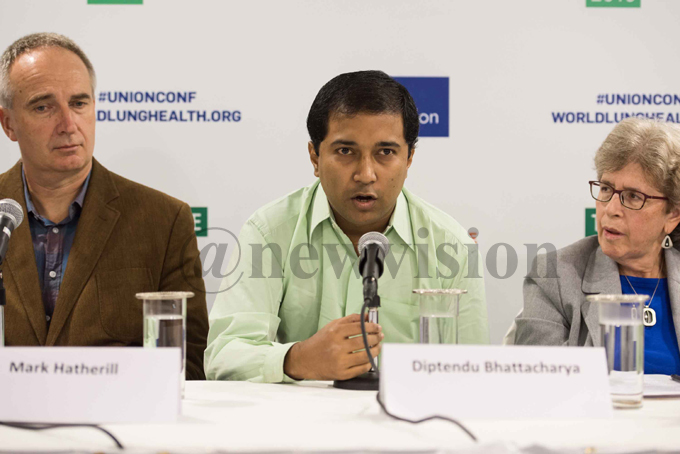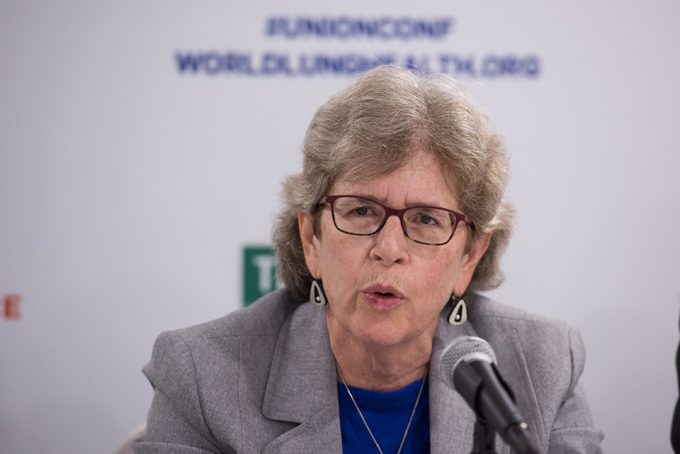Vaccines the only way to eliminate TB in Sub-Saharan Africa - experts
One-quarter of the global population is estimated to have latent tuberculosis infection, and tuberculosis is the leading infectious cause of death worldwide.
Scientists and tuberculosis (TB) survivors have said an effective vaccine is the only solution that will eliminate TB in sub-Saharan Africa.
Speaking on Tuesday during the opening of the 50th Union World Conference on Lung Health in Hyderabad, India, Dr. Paula I Fujiwara, Scientific Director of the International Union Against Tuberculosis and Lung Disease (The Union), said they are cautious, but excited that they are getting closer to a TB vaccine.
"A vaccine is the ultimate prevention tool and as researchers discuss how to move the trial into its final phase, we simultaneously need to be doing all we can to prevent TB with medications that we already have at our disposal," Fujiwara said.
Dr. Fujiwara said TB is a disease that is preventable, treatable and curable, yet last year alone, it killed 1.5 million people globally, more than HIV/AIDS.
"We cannot end the TB emergency unless we dramatically scale up prevention in those parts of the world where we are treating it. The cost of inaction is more unnecessary suffering and death," she added.

Diptendu Bhattacharya a survivor of TB speaking at the conference
She said India has the highest TB burden in the world with just over one in four of all estimated global cases reported in that country.
One-quarter of the global population is estimated to have latent tuberculosis infection, and tuberculosis is the leading infectious cause of death worldwide.
There were an estimated 10 million new tuberculosis cases and 1.5 million deaths attributed to tuberculosis in 2018.
Pulmonary tuberculosis, which involves the lung, is responsible for the spread of the disease from a person-to-person, making an effective vaccine against TB administered in adolescents and adults a must-have.
Jamhoih Tonsing, the Director of The Union's southeast Asia Office in New Delhi, said the Indian government has made the fight against TB a central priority and boldly pledged to end TB by 2025, five years before the globally agreed target.
"We cannot eliminate TB globally unless we end it in India. The World Health Organization (WHO)'s recent Global TB Report indicated that the number of people with TB in India is falling and that is good news. But let us be honest, TB is still not falling nearly fast enough in India, progress is still too slow to meet the targets. We need to step up the pace of treatment and prevention," Tonsing added.
During the conference, a final analysis of phase 2b TB study was revealed that vaccines contributed to preventing TB in people who participated in the trial that was done in Kenya, South Africa, and Zambia.
According to Ann Ginsberg, the senior technical advisor at The International AIDS Vaccine Initiative (IAVI), the trial was conducted in TB-endemic regions Kenya, South Africa and Zambia) and involved 3,573 HIV-negative adults between the ages of 18 and 50 years.

Ann Ginsberg, IAVI at a press conference
She said participants who received two doses of either M72/AS01E or placebo 30 days apart were followed for three years to detect evidence of pulmonary tuberculosis disease. In the final analysis, 13 participants in the vaccine group developed active pulmonary tuberculosis compared to 26 participants in the placebo group.
Among participants who received the vaccine, an increased M72-specific immune response was sustained through three years.
The study was conducted in partnership with GlaxoSmithKline (GSK) a British multinational pharmaceutical company and IAVI.
She said the objective of the study was to assess whether M72/AS01E could prevent a significant number of TB disease cases in HIV-negative adults with latent TB infection compared to placebo and whether the vaccine had an acceptable safety and tolerability profile.
"These results demonstrate that for the first time in almost a century, the global community potentially has a new tool to help provide protection against TB," she said.
She said IAVI remains committed to working in partnership with a number of global organisations to develop a robust pipeline of TB vaccine candidates that could help stop the urgent, global TB epidemic
"The development of this candidate vaccine is an example of the importance of partnerships between organisations and funders committed to using their complementary scientific expertise and technology to advance the fight against diseases that impact global health," she said.
Dr. Thomas Breuer, Chief Medical Officer of GSK said, currently, multi-drug resistant strains of TB are emerging and spreading globally, and the only available TB vaccine, Bacillus Calmette Guerin (BCG) does not provide proven and consistent protection in adults in TB endemic countries.
"Without a more effective vaccine, it will not be possible to achieve the World Health Organization target of decreasing the number of new cases by 90% and the number of TB deaths by 95% between 2015 and 2035," he said.
Dr. Breuer, however, said the results demonstrate that for the first time in almost a century, the global community potentially has a new tool to help provide protection against TB.
Dr. Mark Feinberg, President and CEO of IAVI, said despite of these, additional trials need to be conducted to provides protection in adults who are already infected with the bacteria that cause TB.